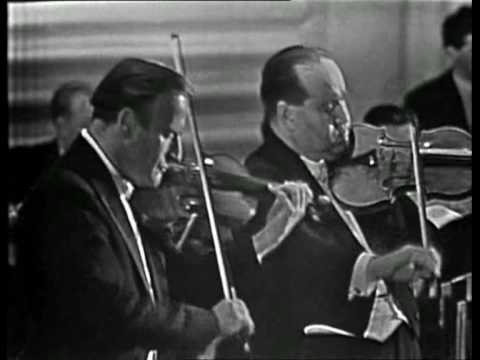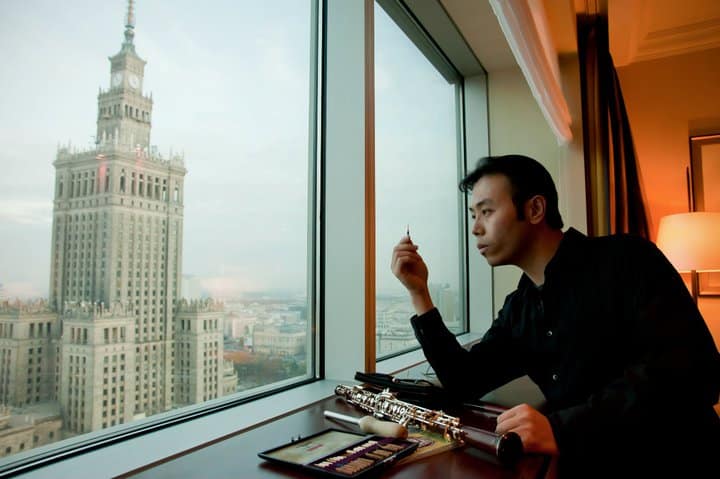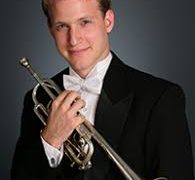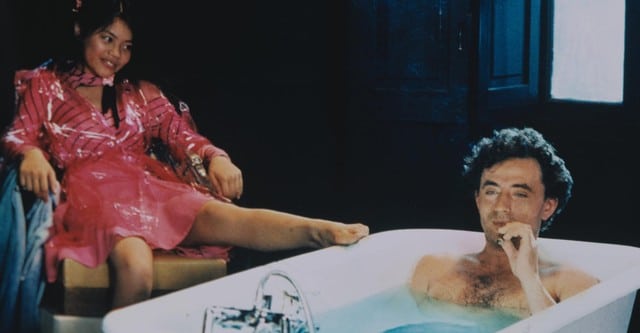Why nobody writes more than one violin concerto
Album Of The WeekFrom the Lebrecht Album of the Week:
Writing a violin concerto is no easy matter. Look no further than Beethoven, who composed just the one and turned it into all-out war between soloist and orchestra. Other romantic-era composers took note and never attempted a second concerto — or, if they did, never succeeded.
Mendelssohn, Brahms, Tchaikovsky, Dvorak, Sibelius, Elgar put all they had to say in one violin concerto. The stock of concertos has remained small as a result, and not for want of trying…
Read on here.
And here.
pictured: Menuhin with Oistrakh






Bruch…?
But like NL says, only the First gets played these days. The others are recorded but that’s about all the exposure they get.
…”never succeeded..”
Nice of My Scena to juxtapose an ad for the Mozart violin concerti (very plural) next to this article.
Still, an interesting article. Always worth giving something lost an airing — if good enough it will find its place, if not, back to obscurity. Which is why all the fuss over women and minority composers will settle.
A few real gems may be unearthed, and having something new to learn and perform keeps musicians fresh and energetic. But the dross will fade back as musicians equally do not wish to spend all their energy on things not worth playing, or hearing.
“………. if good enough it will find its place”. That is no longer so, from ca. the sixties of the last century onwards. Because the situation, the constitution, of the classical music world has drastically changed. Before that time, there was something like an ‘instinctive filter’ concerning repertoire, because music life was quite small-scale, the networks tight, the connections clear, the audience well-defined. All of that has changed: media, accessibility, the recording industry, modern mass consumption society, liberation of the masses who embraced industrial commercial ‘music’, education accessible to all and musical education gradually thinning-out, and as the cherry on the pudding modernist ideology which created a straightjacket for new music on entirely false premisses, opening the doors to amateurs and fakes.
In short: there are no artistic standards any longer becasue the notion of a tradition with a bunch of aesthetic values, however flexible, has disappeared. Then, the offerings are so varied that nobody has any incling of what may be ‘good’ or not, and that is why we see lots of entirely mediocre baroque music being fêted and as mediocre new music of all kinds of styles.
Writing violin concertos needs a bit of practicing, you need to build-up some experience, writing only one is not enough.
https://donemus.nl/review-of-the-second-violin-concerto-of-john-borstlap/
Mendelssohn wrote two, E minor and d minor!
But only one is worth listening to; the Mendelssohn Violin Concerto …in e-minor!
But only one “succeeded!”
What’s the difference between a Harley-Davidson mechanic, AND a viola player?
The mechanic tunes every day!
Yawn. First of all, this is utterly irrelevant to the subject matter. Secondly, it’s 2024. It’s time to move on from stale viola jokes. They only make you sound shortsighted and ignorant.
You must have had a very unhappy childhood.
Prokofiev 2, Shostakovich 2
Bartok: 2…..and the orchestration of the 1st calls for TWO harps……ok, name another violin concerto with
two harps…..
Yes to Prok2, no to Shost2 (same for his cello concertos).
Henze 3
Bold.
I’m not sure if you know anything about classical music, but this statement is completely in-factual.
Beethoven VC + Beethoven Triple Concerto.
Bach x 2 + Double.
Bartok x 2
Brahms VC + Double Concerto with Cello.
Bruch x 3
Haydn x 4
Mendelssohn x 2 (D Minor and famous E Minor)
Prokofiev x 2
Wieniawski x 2
Shostakovich x 2
Szymanowski x 2
Saint-Saens x 3
Vieuxtemps x 4
Paganini x 6
Just to name a few …
I specified romantic composers. Can you read?
Do you know when the period’s start and finish? Most of the list above were contemporaries of those you listed.
Mr Lebrecht I have appreciated your writing and many of your books for years, but this is probably bad research and scholarship. John Su is right, and there’s no reason to insult him because of that. Yes, you specified “Romantic composers” , and though John Su included composers from different eras, he did mention several instances of Romantic composers (Vieuxtemps, Saint Saëns, Brunch and Mendelssohn) who did write several violin concertos. So even by your own metric, your list is wrong. I would even add Mendelssohn’s concerto for violin and piano as his third violin concerto.
Final note. You want to talk about Romantic composers who only wrote one violin concerto and your featured picture is that of Bach’s double concerto, who is obviously not a romantic composer, and who did write several violin concertos. Why so many inconsistencies?
I can’t wait for a performance of the Brunch concerto (in Yum-major?), which will be given, obviously not in a lunchtime concert.
It would seem from the instantly-outraged replies that few can read. See a statement, assume superiority, fail to notice the qualifying adjective AND REACT!
Johnsu lists 5 romantic composers — for those who can read.
You didn’t really specify romantic composers, just mentioned the Idea of other composers of the era. Making a bold title as such shouldn’t limit views to one genre but explore what else is out there. Also claiming that violin concerti stocks fall short is rather an insult to other instruments that truly lack in concertos, when they can be equally as virtuosic.
Since you classified Beethoven as a romantic-era composer, Paganini must be a romantic too. He outlived Beethoven by 13 years.
The heading is ‘Why NOBODY writes more than one violin concerto. By the way, there’s a C major concerto by Beethoven – an early work. The first 259 bars survive – it may have been completed. Let’s say that he wrote 1.25 violin concertos.
The majority of the composers on that list are of the “Romantic” era.
Yes, we can read. But you also say “The stock of concertos has remained small”. Now to what period are you talking about?
Max Bruch has 3 concertos. Spohr has 9, Paganini a few, Saint-Saens has 3…
My question is: since we know how to read, do you know what you wrote?
Look at your headline: “Why nobody writes more than one violin concerto.”
Ouch! Surely, you don’t want to start a long, never-ending debate on what’s “Romantic” vs what’s not.
Regarding more modern composers & their music and arguments re whether they, and the music of non European Caucasians, get their fair, deserved due: to quote Duke Ellington, “if it sounds good, it is good.” It’s like the question of whether the USA is a better place to live than someplace else – are there people trying to sneak into Putin’s Russia? Are there people trying to sneak out of the US? Does anyone, including your 17 y.o. Taylor Swift (and her music) super-fan, REALLY believe that anyone will be listening to her music 200 years after her death? Well, Beethoven died in 1827 and there’s never a week without a Beethoven work in some performance somewhere! And it’s not only old people. Have you noticed how many young terrific musicians are members of, say, the Concertgebouw Orchestra?
If it’s good enough, it will be demanded by the public and it won’t matter what the composer looked/looks like.
You’d be surprised, but with 11,640,599 immigrants Russia takes the 3d place in the world. Only Germany (13,132,146) and the USA (50,661,149) have more.
A comprehensive list, Johnu, but there are many more – incidentally, Vieuxtemps x 7 – not x 4 as you say!
To add to your list:
Vivaldi x 230
Viotti x 29
Telemann x 24
Spohr x 22
Kreutzer, Rodolphe x 19
Rode x 13
Bacewicz x 7
Hubay x 4
Lipinski x 4
Stanford x 3
Lalo x 3 (including Symphonie Espagnole)
Joachim x 3
Godard x 2
Khrennikov x 2
Berwald x 2 (one for 2 violins, the other for 1)
Dohnanyi x 2
Raff x 2
…and probably many others.
18C composer Joachim Alzheimer wrote 27 violin concertos, but among musicologists a suspicion has arisen that 15 of them are the same as 15 from the 27, only transposed a second. This led to a much more difficult solo part, which may be the reason that they have been forgotten.
And Spohr, who has at least 18 violin concertos.
Here is one:
https://www.youtube.com/watch?v=zIJ6FEjFob4
I think it is a very lame piece.
I like them anyway!
“They said Mozart was mad. They said Tchaikovsky was mad. They said Louis was mad.”
“Who’s Louis?”
“Louis’s my uncle. He is mad.”
Spohr’s Mendelssohn-and-water violin concertos – there seems to be some disagreement about how many there are – make for quite attractive easy listening, but they suffer from the same lack of variety and drama as his Schumann-and-water symphonies. He did know what his public wanted, it has to be said. And his chamber music is at another level altogether.
Andrew, just for the sake of pedantry I can vouch for the total number of Spohr’s violin concertos. There has been some serious inflation within this thread – first 9, then 18. My bid was 22, but I underestimated him – it was 24.
cpo recorded them on 8 CDs. The numbered ones span 1 to 15. Then there are unnumbered ones in A major, G major, E minor and a single movement in D major. Finally there are two conceros for 2 violins. That makes 21 in the cpo series. But there also are two concertos for violin and harp and also a double concerto for violin and cello. That makes 24. But if you really want to stretch it to 25, there is his concerto for string quartet, which, of course, includes two violins among the soloists.
To call them ‘Mendelssohn and water’ is, I think, rather extreme. No 8, in a single movement, is a powerful work written in the style of an operatic aria. For its time (1816) it is strikingly original – in turn dramatic and lyrical. Spohr’s chromatic harmonies must have sounded ‘modern’ then, and in the hands of Heifetz, who rises to all the virtuoso challenges, it becomes a masterpiece.
The other concertos are always at least lyrical and well written – maybe not masterpieces but then, how many of the examples cited in this thread could be truly described as such?
Spohr has, sadly, fallen from grace through the years. Perhaps he was too prolific a composer for his own good – but his delightful Octet and Nonet still survive in the repertoire.
But then, to complicate matters still further, what to do with the 36 string quartets? Many of them have disproportionately difficult first violin parts because Spohr would perform them on occasions where there was no orchestra available and he could not therefore give one of his concertos for violin and orchestra an outing.
The problem with Spohr – in that 8th vl concerto, at least – is the phrasing and rhythm: everything is predictable, conventional, easy listening. It has taste, nice expression, is well-made, but he has no real invention, whatever he tries to make the form interesting. so, even that falls flat. It sounds like someone who loves Mozart (as we know he did) but only seems to have picked-up the type of gentle, caressing melodies, but not the spirited deviations from patterns which spice almost everything Mozart wrote, and the springy rhythm – Spohr is very down-beat.
There is a whole background missing in Spohr and that is not a matter of talent but of character. You can hear in his music a very pleasant, sympathetic, well-meaning and sophisticated personality, but without emotional depth. It is like someone entering a room and immediately seeking-out the most comfortable chair and then begin a pleasant conversation over tea.
Not convinced? Here it is again:
https://www.youtube.com/watch?v=XARrlKllLa4
Prokofiev, Bartok, Szymanowsi, Martinu + Shostakovich all wrote two
I believe part of the reason why most major composers wrote only one violin concerto is because they might have wanted their one and only violin concerto to stand as a major work. But there are many composers who did write more than one violin concerto — Milhaud (very much neglected), Prokofiev, Bartok (#1 is rarely played), Mozart, Vivaldi, Haydn, Bach, Bruch, Lalo, Philip Glass (#1 is a masterpiece in my opinion), Wieniawski, Vieuxtemps, Paganini, and perhaps others I can’t think of.
Another reason might be the ability to write well for the violin, which is not a given for many composers. But the main reason, in my opinion, is due to the very limits of the violin as an instrument compared to, for instance, piano repertoire, which is infinitely richer due to the instrument’s very capabilities. This might be why there tends to be several piano concertos written by major composers — because the piano, as an instrument, can go much further than the violin in depth and musical expression. Many will probably disagree with me, but violin repertoire often tends to veer into sheer (and sometimes cheap) virtuosity that holds little musical interest, often becoming a showcase for the instrument itself, whereas the musical palette of emotions made possible by the piano as an instrument is simply incomparable. We do not have, in violin repertoire, anywhere near the musical equivalent of Beethoven’s Op. 111, the late Brahms piano works, Franck’s Prelude, Choral and Fugue, or Schumann’s Fantasy. That’s an altogether different story though if one considers string quartet repertoire — Beethoven late quartets, Haydn, Mozart, Schubert and Brahms come to mind. But on the whole, in my personal and admittedly subjective opinion (though supported by many years of violin playing), there are very few violin concertos that can truly stand as musical masterpieces — personally I would list Beethoven, Brahms, Prokofiev 1, Stravinsky, Barber, Elgar, Glass 1, Ligeti, Schumann, and Milhaud 2. Though not a concerto, I would also add to such a list the Chausson Poème.
No, many will not disagree with you. I dare say most will. The expressive potential of the violin is as infinite as is possible for any instrument, aside from the human voice itself. If composers cannot write well for the violin or lack the insight or inspiration to so do, that is their weakness, not the violin’s. Listen to Bach’s works for unaccompanied violin. Listen to the Brahms violin sonatas or the two overlooked Faure sonatas, to start. All you need to hear. As for the piano, it takes a true master to make a piano sing, or give real nuance and subtlety. It is by nature a less expressive instrument than either a violin or, say, an oboe or a clarinet. It often tends to be loud, percussive, and overbearing. It is the instrument of choice because for most composers, it is what they happen to play. They don’t have to depend on someone else to have their music heard that way. Plenty of empty virtuosity in the piano repertoire as well. It not only does not go way beyond the depth of expression of the violin, it cannot equal it. The dominance of the piano is merely an artifact of composer convenience and lack of imagination. As a violinist, you should know better. What piano piece would not sound better played by a small orchestra? Also, how can you omit the Mozart 4 & 5, Dvorak, Tchaikovsky, Sibelius, Khachaturian, and Bartok 2 (among other) concertos?
Joseph Joachim wrote three.
Spohr (1784-1859), 18.
Paganini (1782-1840), 6
Perhaps they never succeeded?
Is the Beethoven concerto really a war between soloist and orchestra?
To name but two, Louis Spohr, violinist and romantic composer wrote 15 and Vieuxtemps also romantic wrote 7.
I’ve also never heard of the Beethoven concerto described as ‘all-out war’.
The entire article is a work of fiction.
Mendelssohn wrote two; there is an earlier one in D minor Mendelssohn wrote at 13. Occasionally played.
Decent start of a premise. But what about Mozart. Shostakovich. Prokofiev. Paganini?
Jeno Hubay 3, Carl Reineke 2…
Beethoven started another, earlier in his career, just part of one movement.
Mendelssohn has one from his early years.
Bruch actually wrote three, but only the First holds the board.
Saint-Saens likewise wrote three, and in his case it us his last, the Third, that has maintained itself.
Wieniawski wrote two, and the Second is quite popular.
Prokofiev and Shostakovich each wrote two, and both are played.
I am not referring to the numerous concertante pieces which are not full fledged concertos, nor the numerous examples by Haydn and Mozart, who were ready to write one for the violin as for anything else if they occasion warranted, and this is even more true of the Baroque composers.
Neo-romantic composer RAAF (don’t call me Ralph) Vaughn Williams also wrote a sorta half violin concerto just on a lark.
How many v. con.Vivaldi wrote?
Could apply to cello as well, for the matter….
Actually, Mendelssohn also wrote a concerto for violin and piano – so two and a half for him.
Bruch is surely a Romantic composer even though he outlived his era, and a case can be made that he wrote more than 3, perhaps as many as 5, depending on what you are willing to call a “concerto.” Others have mentioned Mendelssohn and Saint-Saëns.
Lalo wrote two and that isn’t even counting the Symphonie espagnole (which I do, so I’d say 3 for Lalo). And all of them are good. Joachim Raff wrote a couple, as did Sinding.
I have seen Schumann’s Fantasie for Violin and Orchestra described as a concerto, which makes two for him. Then there is the arrangement for violin of the Concerto for Cello and Orchestra. Schumann himself made the arrangement so if you are in a generous mood you could argue 3 for Schumann.
I understand why the first movement torso of a violin concerto by Beethoven doesn’t really count. But there it sits. We gotta call it something!
Joseph Joachim wrote 3 of which No. 2, the “Hungarian” is played and recorded now and then. That brings up all the Romantic era virtuoso who rarely stopped at just one. Paganini, Ernst, Rode, Hubay, Wieniawski, Wilhelmj, Lipinski, and Vieuxtemps of course, but also de Beriot (at least 10), Ferdinand David wrote a half-dozen. Kreutzer wrote nearly 20, but he sits between the classical and early Romantic eras. I’d count him if we are counting Beethoven. Viotti is perhaps
too early for Romantic although there are bel canto elements in his slow movements.
I know many of these names are not A-list (except to violinists perhaps) but the fact remains that some familiar “standard repertoire” names from the Romantic era wrote more than one fiddle concerto, even if the concertos themselves are not standard repertoire.
I guess you do not count Bach, Mozart and Vivaldi as composers. You might want to check them out, they are fairly talented!
An ignorant piece, sorry!
Paganini wrote 5 concertos, Ysaye 8, Weniawski 2
Jörg Widmann x 2
That is clearly not true as there are many composers who wrote multiple VC’s Schnittke, Prokofiev, Grayzna Bacewicz, John Adams has written 3 and counting
I have seen many of these live including Adams great Dharma at Big Sur
And let’s not forget Samuel Barber and his battle with the violinist who commissioned and rejected his concerto.
What about Prokofiev (2) and Shostakovich (2)?
To claim that no romantic wrote more than one successful violin concerto is an overstatement. One needs to look no further than Paganini—unquestionably a romantic.
How can we tweak the statement to bring it closer to reality? How about this: “very few romantic composers wrote more than one highly successful violin concerto.” Maybe we could generalize further. How about: “very few romantic composers wrote more than one highly successful concerto for the same instrument, except for the piano”.
Prokofiev composed 2.
I never understand why people want to listen to one violin in front of all of the others. There are enough violins to be heard during a concert!
Sally
Just to add to the pot-stirring I throw in that little known NON Romantic era composer John Williams, with his three violin concerti/oes.
Two of the world bear the official titles of Concerto 1 and 2, but in between those two he wrote “Treesong” which went from being called a violin concerto to a “programme piece for violin and orchestra”.
Some still consider Treesong to be Violin Concerto 2, and the current VC2 to be VC3. Sometimes there ain’t jus’ no pleasing folks.
Schittke, 4. Prokofiev, Schostakovich, and Martinu, two each (plus oodles of other concerted works by B.M.). Bruch, 3 + the Scottish Fantasy + the 4-movt. Serenade. Dohnanyi, 2. Bartok, 2. Saint-Saens, 3. Mendelssohn-Bartholdy (and it us absurd how many critics forget the earlier d- work).
Earlier, the numbers get almost stupifying large: Viotti, 29. Kreutzer, 19. Rode. de Beriot. Vieuxtemps, 7 (with an 8th incomplete). Wieniawski, 2, + various other concerted works (e.g., Faust Fantasia). Rolla, into the hundreds (!) Paganini, 6.
And one not even need mention FJHaydn (at least three), Mozart (5~8, depending on whether accepts the canonicity of some of the higher K.number works), Tartini (29), Locatelli (set of 12), and of course, the most prolific of all, the Red Priest, Antonio Vivaldi, with at 488 solo concertos.
Time for N.L. to revise his thesis with actual factual data, eh.~
Schittke? You are out of ordure.
How about Spohr, Mercadante, de Beriot, Kreisler, etc?
Alan Rawsthorne
Bartok wrote two. Some of the classical composers wrote several. As if the entire world rotates around Beethoven. That is typical ignorance.
I happen to *like* the Busoni Violin Concerto – always have, ever since hearing a miserable-sounding 1930s relay with Adolf Busch and Bruno Walter, longer ago than I care to admit. Fortunately, there are a few modern recordings that give me more pleasure than that.